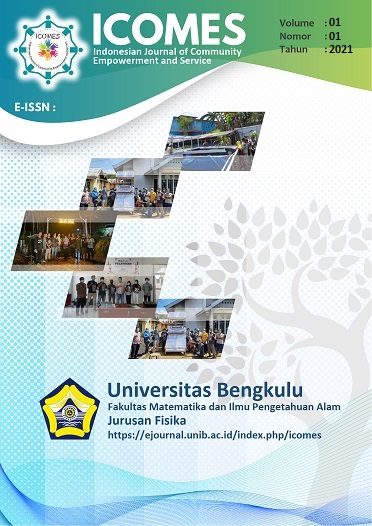Main Article Content
Abstract
Mompreneur village, which is currently established under the guidance of the HMTG "GAIA" Village Development and Empowerment Program Team (P3D), has succeeded with the traditional drink product "seruputan" which has been able to be sold outside of Yogyakarta. However, the current problem is that the production of the product is constrained due to the lack of raw materials for the main spices. On the other hand, there are residents' land that has not been used. The purpose of this service is to increase the spice land by utilizing the land of residents who are not yet productive. As a result, the creation of a “sruputan” spice garden together with the assisted residents was achieved according to the target by planting various spices that sparked business ideas in innovating various flavors of 'sruputan' products and other forms of slurry products.
Keywords: Spice Garden, traditional drinks, village empowerment, putat wetan
Article Details
The author has the copyright and entitles the journal to the first publication with works that are licensed simultaneously under the Creative Commons Attribution CC BY License which allows others to share their work with the recognition of the authorship of the work and initial publications in this journal.
The author can make separate additional contract agreements for the non-exclusive distribution of published journal versions of the work (for example, posting them to the institutional repository or publishing them in a book), with recognition of the initial publication in this journal.
Authors are permitted and encouraged to post their work online (e.g., in institutional repositories or on their websites) before and during the delivery process because it can lead to productive exchanges, as well as quotes that are earlier and larger than published works
References
- Dzakiya, N., Costa, F.S. S.D., Prasetyo R.E,, Bawono, D.C., Ardianto, A., (2020), Kampung Mompreneur: Pembinaan Dan Pemberdayaan Anggota Pkk Putat Wetan Berbasis Kewirausaan, Prosiding Seminar Nasional ke-6 LPPM UPN ‘Veteran’ Yogayakarta, Yogyakarta, 3 November.
- Dzakiya, N., Fitria, R.L2, Mu’minin, Z.E.A, Tsanie, R.A., Amanda, E., Sinaga, R.M., Safriani, M.F., Pangaribuan, M.P., (2021), Optimalisasi Produk Minuman Tradisional Seruputan PKK Putat Wetan dengan Program Kampung Mompreneur. Jurnal Abdimas PHB Vol.4, No.2.
- Frinces, Z.H., (2010), Pentingnya Profesi Wirausaha di Indonesia, Jurnal Ekonomi dan Pendidikan, Vol. 7, No. 1, April 2010.
- Hafer, R.W., (2013), Entrepreneurship and State Economic Growth, Journal of Entrepreneurshop and Public Policy, Vol. 2, Issue 1, pp.67-79.
- Hermuningsih, S., Widiastuti, R., Kurniawan, VRB., (2018), Program Pengembangankewirausahaan (PPK) Di Universitas Sarjanawiyata Tamansiswa, Jurnal Dharma Bakti, Vol 1. No1.
- Nugrahani, T.S., Susetyo, H.B., Birsyada, M.I., (2018), Budidaya Toga Dan Pembuatan Pupuk Kompos Sebagai Upaya Peningkatan Penghasilan Warga Dusun Salakan, Jurnal Dharma Bakti, Vol 1, No 1.
- Praditya, F.A., Dzakiya, N., Afifa, W.H., Latifah, R.N., Nurady, D., (2021), Pemanfaatan Lahan Bantaran Rel Sebagai “Kebun Desa Mandiri Di Padukuhan Banyumeneng, Jurnal Dharma Bakti Vol, 4. No 2.
- Pranoto, A., Sulistyaningsih, E., Dzakiya, N., (2020). Analisis Faktor-Faktor Yang Mempengaruhi Motivasi Wirausaha Era Revolusi Industri 4.0 Mahasiswa IST Akprind Yogyakarta, Jurnal Pendidikan Vokasi Otomotif, Vol 3 No 1.
- Utami, M.P., Kencanawati, K., Rizkiah, R., Yulianti, D., (2020). Pembuatan Sabun Padat di TKIT Qurrata A’yun di Cimahi, Jurnal Dharma Bakti, Vol. 3 No 1.
- Wardoyo, H., (2015), Penguatan Pengelolaan keuangan Desa dan Optimalisasi Peran BUMDES Sebuah Upaya Menuju Desa Mandiri dan Kredibel di Kabupaten Kulon Progo, Seminar Nasional Temu Forum Dosen Akuntansi Sektor Publik, Universitas Atma Jaya Yogyakarta, 9 April 2015.
References
Dzakiya, N., Costa, F.S. S.D., Prasetyo R.E,, Bawono, D.C., Ardianto, A., (2020), Kampung Mompreneur: Pembinaan Dan Pemberdayaan Anggota Pkk Putat Wetan Berbasis Kewirausaan, Prosiding Seminar Nasional ke-6 LPPM UPN ‘Veteran’ Yogayakarta, Yogyakarta, 3 November.
Dzakiya, N., Fitria, R.L2, Mu’minin, Z.E.A, Tsanie, R.A., Amanda, E., Sinaga, R.M., Safriani, M.F., Pangaribuan, M.P., (2021), Optimalisasi Produk Minuman Tradisional Seruputan PKK Putat Wetan dengan Program Kampung Mompreneur. Jurnal Abdimas PHB Vol.4, No.2.
Frinces, Z.H., (2010), Pentingnya Profesi Wirausaha di Indonesia, Jurnal Ekonomi dan Pendidikan, Vol. 7, No. 1, April 2010.
Hafer, R.W., (2013), Entrepreneurship and State Economic Growth, Journal of Entrepreneurshop and Public Policy, Vol. 2, Issue 1, pp.67-79.
Hermuningsih, S., Widiastuti, R., Kurniawan, VRB., (2018), Program Pengembangankewirausahaan (PPK) Di Universitas Sarjanawiyata Tamansiswa, Jurnal Dharma Bakti, Vol 1. No1.
Nugrahani, T.S., Susetyo, H.B., Birsyada, M.I., (2018), Budidaya Toga Dan Pembuatan Pupuk Kompos Sebagai Upaya Peningkatan Penghasilan Warga Dusun Salakan, Jurnal Dharma Bakti, Vol 1, No 1.
Praditya, F.A., Dzakiya, N., Afifa, W.H., Latifah, R.N., Nurady, D., (2021), Pemanfaatan Lahan Bantaran Rel Sebagai “Kebun Desa Mandiri Di Padukuhan Banyumeneng, Jurnal Dharma Bakti Vol, 4. No 2.
Pranoto, A., Sulistyaningsih, E., Dzakiya, N., (2020). Analisis Faktor-Faktor Yang Mempengaruhi Motivasi Wirausaha Era Revolusi Industri 4.0 Mahasiswa IST Akprind Yogyakarta, Jurnal Pendidikan Vokasi Otomotif, Vol 3 No 1.
Utami, M.P., Kencanawati, K., Rizkiah, R., Yulianti, D., (2020). Pembuatan Sabun Padat di TKIT Qurrata A’yun di Cimahi, Jurnal Dharma Bakti, Vol. 3 No 1.
Wardoyo, H., (2015), Penguatan Pengelolaan keuangan Desa dan Optimalisasi Peran BUMDES Sebuah Upaya Menuju Desa Mandiri dan Kredibel di Kabupaten Kulon Progo, Seminar Nasional Temu Forum Dosen Akuntansi Sektor Publik, Universitas Atma Jaya Yogyakarta, 9 April 2015.
